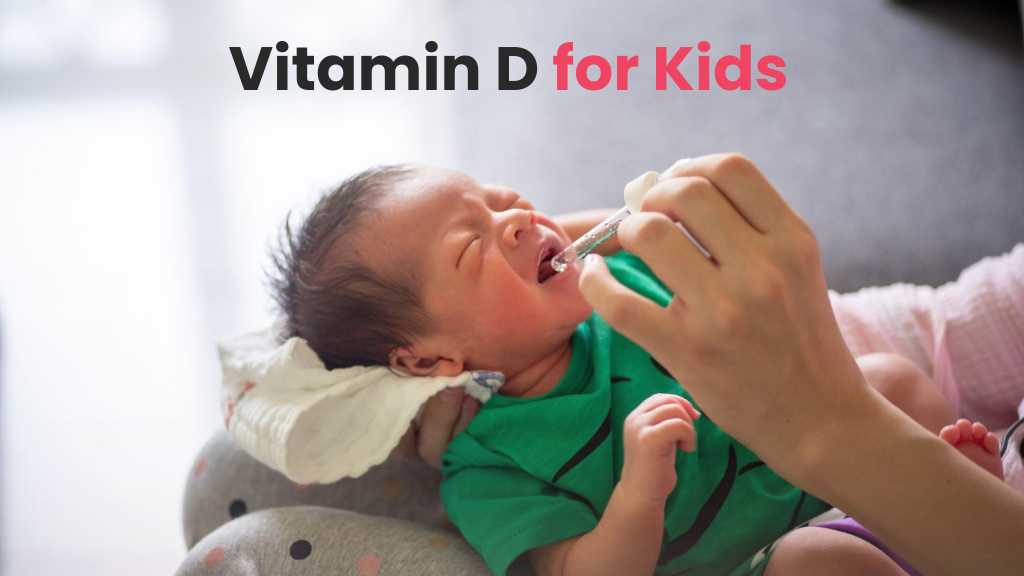
Table of Contents
Introduction: Vitamin D for Kids
Vitamin D, often referred to as the “sunshine vitamin,” plays a crucial role in the growth and development of children. It is essential for strong bones, a healthy immune system, and overall well-being. In this comprehensive guide, we will explore the importance of vitamin D for kids, sources of this vital nutrient, recommended daily intake, signs of deficiency, and ways to ensure your child gets enough of this essential vitamin.
Why is Vitamin D Important for Kids?
Vitamin D for kids is super important because of several reasons:
- Bone Health: Vitamin D helps the body absorb calcium, a mineral vital for bone growth and development. It ensures that children develop strong and healthy bones, reducing the risk of conditions like rickets.
- Immune System Support: Adequate levels of vitamin D are linked to a well-functioning immune system. It helps the body fight infections and reduces the risk of chronic diseases.
- Mood and Mental Health: Some studies suggest a link between vitamin D deficiency and mood disorders in children. Maintaining sufficient levels of vitamin D may contribute to better mental health.
- Muscle Function: Vitamin D is essential for proper muscle function, which is crucial for physical activities and overall mobility in children.
Sources of Vitamin D for kids
- Sunlight: The sun is a natural source of vitamin D. When the skin is exposed to sunlight, it produces vitamin D. However, it’s important to balance sun exposure to prevent skin damage.
- Diet: While not abundant, some foods naturally contain vitamin D. Fatty fish like salmon and mackerel, egg yolks, and fortified foods such as milk, orange juice, and breakfast cereals are good sources.
- Supplements: In some cases, pediatricians may recommend vitamin D supplement for kids at higher risk of deficiency, such as those with limited sun exposure or specific medical conditions.
Recommended Daily Intake
The recommended daily intake of vitamin D varies based on age:
– Infants (0-12 months): 400 IU (10 mcg) per day.
– Children (1-18 years): 600 IU (15 mcg) per day.
Signs of Vitamin D Deficiency
– Bone pain and muscle weakness
– Delayed growth
– Fatigue and general weakness
– Frequent infections
– Mood changes
Ensuring Your Child Gets Enough Vitamin D
- Outdoor Activities: Encourage outdoor activities while being mindful of sun safety. Aim for 10-15 minutes of sunlight exposure a few times a week.
- Balanced Diet: Include vitamin D-rich foods in your child’s diet, and opt for fortified products when possible.
- Supplements: Consult a pediatrician to determine if your child needs vitamin D supplements, especially during winter months, or if sun exposure is limited.
- Regular Check-ups: Schedule regular check-ups with your child’s healthcare provider to monitor their vitamin D levels and address any concerns.
Getting Vitamin D Naturally: Harnessing the Power of Sunlight and Nutrition
Vitamin D, often called the sunshine vitamin, is crucial for our overall health. While supplements are available, getting vitamin D naturally is not only possible but also beneficial. In this guide, we will explore the natural ways to obtain vitamin D, primarily through sunlight exposure and a balanced diet, ensuring optimal health while enjoying the outdoors and wholesome foods.
Sunlight Exposure; Best Vitamin D For Kids!
How Sunlight Provides Vitamin D
When our skin is exposed to sunlight, it produces vitamin D. Specifically, ultraviolet B (UVB) rays from the sun interact with cholesterol in our skin cells, triggering the synthesis of vitamin D.
Best Practices for Sun Exposure
– Aim for 10-15 minutes of sunlight exposure on your face, arms, and legs a few times a week.
– Opt for morning or late afternoon sun, as it’s gentler on the skin.
– Be mindful of your skin type and the sun’s intensity; fair-skinned individuals need less time in the sun than those with darker skin.
Vitamin D-Rich Foods
Natural Food Sources
– Fatty Fish: Salmon, mackerel, and tuna are excellent sources of vitamin D.
– Egg Yolks: Eggs, especially the yolk, contain vitamin D.
– Fortified Foods: Many dairy products, plant-based milk, orange juice, and breakfast cereals are fortified with vitamin D.
– Mushrooms: Some varieties of mushrooms, like shiitake and maitake, can produce vitamin D when exposed to sunlight.
Factors Affecting Vitamin D Absorption
Balancing Sun Safety and Vitamin D Production
– While sunlight is a natural source of vitamin D, it’s essential to balance sun exposure to prevent skin damage and reduce the risk of skin cancer. Use sunscreen after the initial sun exposure period or cover up with clothing and hats.
– People with darker skin tones may need more sun exposure because melanin reduces the skin’s ability to produce vitamin D.
Obtaining vitamin D naturally through sunlight exposure and a balanced diet is not only effective but also enjoyable and beneficial for overall well-being. By spending time outdoors, incorporating vitamin D-rich foods into your diet, and being mindful of sun safety, you can ensure your body receives this essential nutrient. Remember, moderation and balance are key; enjoy the sun responsibly, nourish your body with vitamin D-rich foods, and embrace a healthy lifestyle that supports your natural vitamin D production.
Who Might Need Vitamin D Supplements?
- Individuals with Limited Sun Exposure: People living in regions with minimal sunlight during certain seasons or those who spend most of their time indoors may lack adequate sun exposure, making supplementation necessary.
- Elderly Individuals: As people age, the skin’s ability to produce vitamin D decreases. Older adults often require supplements to maintain optimal vitamin D levels for bone health.
- Breastfed Infants: Breast milk is a valuable source of nutrition for infants, but it might not provide enough vitamin D. Pediatricians often recommend vitamin D supplements for breastfed infants.
- People with Darker Skin Tones: Melanin, the pigment responsible for darker skin, reduces the skin’s ability to produce vitamin D in response to sunlight. Individuals with darker skin tones might need supplements, especially if they live in regions with limited sunlight.
- Certain Health Conditions: Individuals with certain health conditions like celiac disease, Crohn’s disease, or obesity might have difficulty absorbing vitamin D from food. In such cases, supplements can help meet their nutritional needs.
Choosing the Right Vitamin D Supplement For Kids
Type of Vitamin D: There are two main types of vitamin D supplements: D2 (ergocalciferol) and D3 (cholecalciferol). D3 is the preferred form as it is more effective at raising vitamin D levels in the blood.
Dosage: The appropriate dosage varies based on age, health status, and the advice of a healthcare provider. Common dosages range from 600 to 2000 IU (15 to 50 mcg) per day for adults.
Quality and Purity: Choose supplements from reputable brands or those verified by third-party organizations like NSF, USP, or ConsumerLab.com to ensure quality and purity.
Additional Nutrients: Some supplements combine vitamin D with calcium or other minerals for bone health. Consider your overall nutritional needs and consult a healthcare provider if you’re unsure.
Important Considerations : Vitamin D for kids
- Consult a Healthcare Provider: Before starting any supplement regimen, especially for high doses or if you have underlying health conditions, consult a healthcare provider to determine the right dosage for you.
- Regular Monitoring: If you’re taking vitamin D supplements due to a deficiency, your healthcare provider might recommend regular blood tests to monitor your vitamin D levels and adjust the dosage accordingly.
- Balance with Sun Exposure: If possible, balance vitamin D supplementation with safe sun exposure. Aim for 10-15 minutes of sunlight on your face, arms, and legs a few times a week, especially during the spring and summer months.
Vitamin D supplements can play a vital role in supporting overall health, especially for individuals at risk of deficiency. By understanding who might benefit from supplementation, choosing the right supplement, and consulting healthcare providers, individuals can ensure they maintain optimal vitamin D levels, supporting their bone health, immune system, and overall well-being. Remember, personalized guidance from a healthcare professional is invaluable when it comes to making informed decisions about vitamin D supplementation.
Conclusion; Vitamin D For Kids
Vitamin D is a vital nutrient for children, essential for their overall health and well-being. By ensuring adequate sun exposure, incorporating vitamin D-rich foods into their diet, and consulting healthcare providers when necessary, parents can help their children maintain optimal vitamin D levels, supporting their growth, immunity, and overall health. Remember, a balanced approach is key to ensuring your child gets the right amount of this sunshine vitamin.









